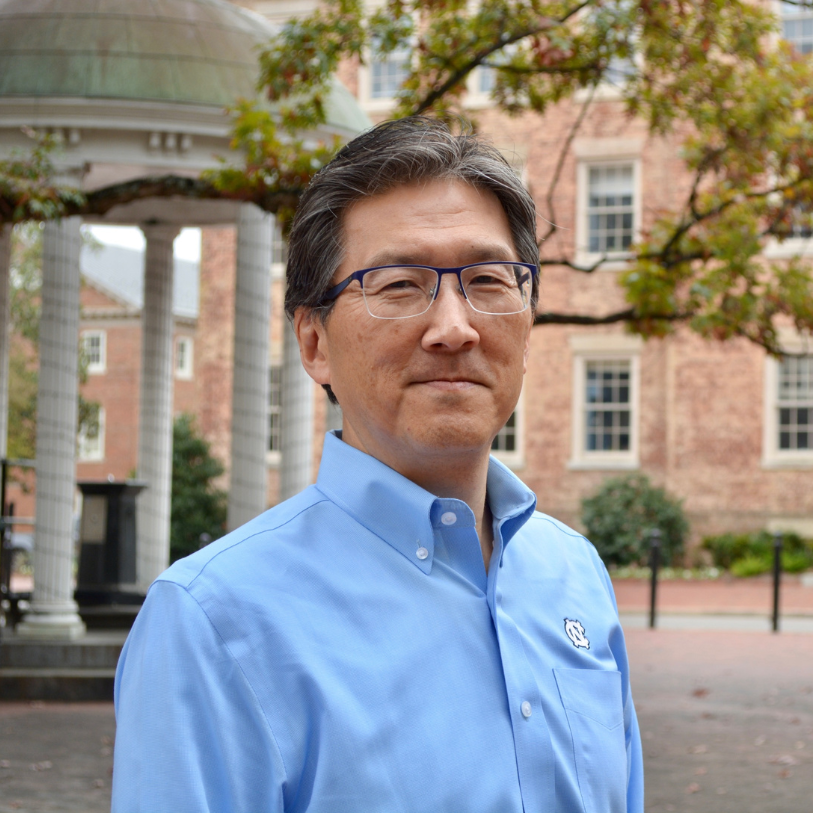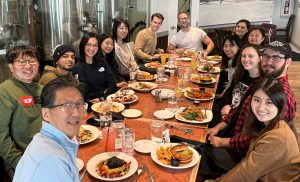
Every year, Koji Sode, William R. Kenan, Jr. Distinguished Professor of Biomedical Engineering, hosts graduate students and postdoctoral fellows from Japan and Korea at his research lab on UNC-Chapel Hill’s campus. A 2018 Fellow of the National Academy of Inventors, Sode is always excited to engage the group and share his latest research, which often fuses biomedical engineering, biology, chemistry and other disciplines. His recent work is focused on developing biosensors, such as devices used by diabetics to continually measure blood sugar.
This project, like Sode’s previous ventures, is grounded in international collaboration, a tenet that is central to his research and teaching. He embraces the fresh perspective shared by students and, beyond the lab, the expertise provided by his international partners in novel biodevice development. When travel was limited due to the pandemic, Sode continued to involve Korean & Japanese Ph.D. students and postdocs who could not travel to UNC-Chapel Hill in his research and as part of the lab team by holding virtual lab meetings.
Sode came to Chapel Hill in 2018 and is now a self-proclaimed Carolina enthusiast. A renowned academic inventor, he has authored more than 340 peer-reviewed papers and holds several international patents for biosensing technologies.
Prior to UNC-Chapel Hill, you had a successful career at the Tokyo University of Agriculture & Technology. Why did you move to North Carolina from Japan?
I had been searching for a new academic environment that kept my intellectual curiosity stimulated, especially in the field of biomedical engineering. When I was introduced to UNC-Chapel Hill’s wonderful academic environment, I was instantly attracted. First, I was drawn to the rich history of academic success, especially the published literature and research achievements. My work involves chemistry, medicine, biology and other sciences, and UNC-Chapel Hill ensures resources are available across all departments, which is essential for innovation. Second, there is a welcoming and friendly environment. I value the open communication with and support from my colleagues across all departments. These relationships create an ideal culture for interdisciplinary collaboration!
Speaking of collaboration, why is it so important to your work?
To collaborate is to expand the possibilities of the research. Like all scientists, I recognize that I have limitations. My visions are bigger than what I can do alone. I need perspectives and knowledge from experts in other countries and from different cultures. Global collaboration is key to achieving a bigger vision in biomedical engineering.
My research partners and I have a shared goal of ensuring our innovations can help people around the world. The current focus on biosensing molecules requires global expertise to make a global impact on patients with diabetes, for example. Collaboration is about applying our collective knowledge to mitigate the impact of this disease.
I’ve also found my research partners quickly become friends.

What is most meaningful about mentoring students at your lab?
It is really meaningful to share in my students’ excitement when they reach milestones. When they’re talking to me enthusiastically about promising results, an article accepted for publication or approved grant funding for their next big idea, and I am happy to experience their emotions with them in these moments.
My students are generous in bringing their ideas and insights into the lab. They have different approaches to problem solving and their questions, though sometimes challenging to answer, lead to great discussion. This all helps to accelerate our research.
It’s also special to connect with such a diverse group of students. I’ve had fellows from Indonesia, Germany, Italy, Sweden, Japan, Korea and many other places. Once they return to their home countries, the students often continue to collaborate with us, and many of them return to Carolina with extended visas.
Finally, what guidance do you have for students interested in a research career?
This campus offers so many opportunities to make this possible; what you need is your curiosity and passion! Of course, money is important, but it’s also important that your motivation does not come from any outside pressures. Be honest and ask yourself what makes you feel inspired. What problems do you want to solve with science and technology? Please bring your ideas to your mentors. They are ready to make you a world champion in research!
Interview by Emily Dennin, UNC Global
